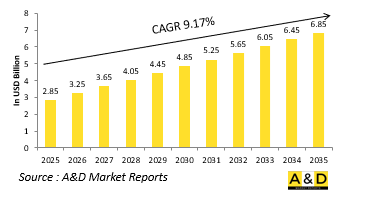
|
시장보고서
상품코드
1719522
전원 테스트 시스템 시장(2025-2035년)Global Power Supply Test Systems 2025-2035 |
||||||
세계의 전원 테스트 시스템 시장 규모는 2025년 28억 5,000만 달러로 추정되며, 2035년까지 68억 5,000만 달러로 성장할 것으로 예측되고 있으며, 예측 기간 중(2025-2035년) 연간 평균 성장률(CAGR) 9.17%로 전망되고 있습니다.

방어용 전원 테스트 시스템은 군사 플랫폼 및 인프라에서 사용되는 전기 시스템의 성능, 신뢰성 및 안전성을 보장하기 위한 기본적인 것입니다. 이러한 테스트 시스템은 레이더, 통신, 무기 시스템, 탑재 전자 기기 등의 중요한 용도를 지원하는 발전, 변환, 배전 부품의 무결성을 검증합니다. 상업 환경과는 달리, 방위 환경에서는 고도, 가혹한 온도 및 전자기 간섭을 포함한 가혹한 조건 하에서 안정적으로 작동하는 전원 시스템이 필요합니다. 테스트 시스템은 설계 및 개발부터 배포, 현장 유지 보수에 이르기까지 다양한 단계에서 사용되며 전원 공급 장치가 일관되게 성능 임계값을 충족하는지 확인합니다. 군사 자산의 전기화와 디지털화가 진행됨에 따라 정확하고 실시간 시험에 대한 요구는 중요성을 증가시키고 있습니다. 이 플랫폼은 고전압 회로의 기능적 안정성을 평가하고 열 거동을 모니터링하며 임무 프로파일을 시뮬레이션하여 모든 상황에서 중단없는 에너지 공급을 보장합니다. 방어 조직은 배포 전에 약점을 파악하고, 미션 성공률을 높이고 장비의 수명주기를 연장하기 위해 이러한 시스템에 의존합니다. 사소한 전기적 결함조차도 미션 크리티컬한 결과를 초래할 수 있는 이 영역에서 전원 테스트 시스템은 육지, 하늘, 바다, 우주를 기반으로 하는 다양한 군사 용도에 정확성과 신뢰성을 제공하여 세계적인 방어 즉응 전략의 중요한 요소가 되고 있습니다.
전원 테스트 시스템 시장에서 기술의 영향 :
기술 혁신은 방어용 전원 테스트 시스템의 기능과 아키텍처를 재형성하여, 보다 다용도, 지능형, 통합적인 것으로 하고 있습니다. 자동화된 테스트는 휴먼 에러를 대폭 감소시켜 보다 신속한 진단과 효율적인 고장 분리가 가능하게 되었습니다. 식별을 통해 예지 보전을 촉진하고 미션의 보증을 강화합니다. 서멀 이미징과 응력 시뮬레이션의 진보로 변동하는 부하나 가혹한 환경에 노출되는 컴포넌트를 보다 깊이 평가할 수 있게 되었습니다. 사이버 보안 프로토콜과의 통합도 중요한 기능이 되어 전력 제어 소프트웨어의 취약성을 시험할 수 있게 되어 있습니다.
전원 테스트 시스템 시장의 주요 촉진요인 :
다양한 전략적 및 운용적 요청이 방위 분야에서 선진적인 전원 테스트 시스템의 세계 요구를 뒷받침하고 있습니다. 더욱 민첩하고 모듈화된 부대 구조로의 전환에 따라 컴팩트하고 유연한 전원 솔루션의 필요성이 증가하고 있으며, 예측할 수 없는 현장 조건에서 성능을 검증해야 합니다. 전원 네트워크의 관리와 테스트의 복잡성이 증가하고 있으며, 방위기관은 다운타임을 최소화하고 플랫폼의 수명을 연장하는 것을 추구하고 있으며, 상태 기반 모니터링과 예측 진단이 최신 테스트 시스템에 필수적인 기능이 되고 있습니다.
전원 테스트 시스템 시장의 지역 동향 :
방어용 전원 테스트 시스템의 배치에 관한 지역 전략은 운영상의 요구, 환경상의 과제, 근대화의 우선 사항의 차이를 반영하고 있습니다. 유럽 국가들은 연합의 상호 운용성과 공동 개발 프로그램을 중시하고 다국간 표준과 혼합 플랫폼의 전력 아키텍처를 지원할 수 있는 테스트 시스템을 채용하고 있습니다. 아시아태평양에서는 방위 인프라가 급성장하고 있어 고유의 플랫폼과 다양한 작전 지형에 대응할 수 있는 확장성과 탄력성이 있는 테스트 솔루션에 대한 수요가 높아지고 있습니다. 라틴아메리카와 아프리카에서는 다목적이고 비용 효율적인 테스트 툴의 배치를 지원하는 파트너십을 통해 그 능력을 점진적으로 확대하고 있으며, 많은 경우 신에너지 구상과 연계하고 있습니다.
주요 전원 테스트 시스템 프로그램
돌격용 회전익기에서 미국의 리더십을 유지하기 위해, 육군은 Future Vertical Lift(FVL) 프로그램의 중요한 요소로서 Future Long-Range Assault 에어크래프트(FLRAA)의 출시를 선호합니다. H-60 Black Hawk를 대체하게 됩니다. 1979년에 처음 도입된 Black Hawk는 아프가니스탄, 이라크를 비롯한 분쟁에서 중요한 역할을 했습니다. Sikorsky와 Honeywell과 같은 주요 공급업체는 항공기가 수많은 업그레이드를 수행하여 냉전 시대의 이 플랫폼이 현대 군사 작전에 효과적이고 적절하다는 것을 보장합니다.
이 보고서는 전 세계 전원 테스트 시스템 시장을 조사했으며, 10년간의 부문별 시장 예측, 기술 동향, 기회 분석, 기업 프로파일, 국가별 데이터 등을 정리했습니다.
목차
방위 분야 세계 전원 테스트 시스템 - 목차
방어 분야 세계 전원 테스트 시스템 보고서 정의
방어 분야 세계 전원 테스트 시스템의 세분화
지역별
기술별
제품 유형별
용도별
향후 10년간의 방위 분야에서 세계 전원 테스트 시스템 분석
국방 분야의 세계 전원 테스트 시스템의 10년간 분석은 국방 분야의 세계 전원 테스트 시스템의 성장, 변화하는 추세, 기술 채용 개요 및 전체 시장 매력에 대한 자세한 개요를 제공하고 이 장에서 설명합니다.
방위 분야에서 세계 전원 테스트 시스템 시장 기술
이 부문에서는 이 시장에 영향을 미칠 것으로 예상되는 상위 10개 기술과 이러한 기술이 시장 전체에 미칠 수 있는 영향에 대해 설명합니다.
방위 분야의 세계 전원 테스트 시스템 예측
이 시장에서 향후 10년간의 세계 방위 전원 테스트 시스템의 예측은 위의 전체 부문에 대해 자세히 설명되어 있습니다.
방위 분야에서 지역별 세계의 전원 테스트 시스템의 동향과 예측
이 부문에서는 지역별 대 드론 시장 동향, 촉진요인, 억제요인, 과제, 그리고 정치, 경제, 사회, 기술 등의 측면을 망라하고 있습니다. 또한 지역별 시장 예측과 시나리오 분석도 자세히 소개하고 있습니다. 지역 분석의 끝에는 주요 기업 프로파일링, 공급업체 상황 및 기업 벤치 마크가 포함되어 있습니다.
북미
촉진요인, 억제요인, 과제
PEST
시장 예측 및 시나리오 분석
주요 기업
공급자 계층의 상황
기업 벤치마킹
유럽
중동
아시아태평양
남미
방위 분야 세계 전원 테스트 시스템의 국가별 분석
이 장에서는 이 시장에서 주요 방어 프로그램을 다루며 이 시장에서 신청된 최신 뉴스와 특허에 대해서도 설명하고, 국가 수준의 10년간 시장 예측과 시나리오 분석에 대해서도 설명합니다.
미국
방어 프로그램
최신 뉴스
특허
이 시장의 현재 기술 성숙도
시장 예측 및 시나리오 분석
캐나다
이탈리아
프랑스
독일
네덜란드
벨기에
스페인
스웨덴
그리스
호주
남아프리카
인도
중국
러시아
한국
일본
말레이시아
싱가포르
브라질
방위 분야의 세계 전원 테스트 시스템의 기회 매트릭스
방위 분야의 세계 전원 테스트 시스템에 대한 전문가의 의견
결론
항공 및 방위 시장 보고서에 대해서
JHS 25.05.15The Global Power Supply Test Systems market is estimated at USD 2.85 billion in 2025, projected to grow to USD 6.85 billion by 2035 at a Compound Annual Growth Rate (CAGR) of 9.17% over the forecast period 2025-2035.

Introduction to Power Supply Test Systems Market
Defense power supply test systems are fundamental to ensuring the performance, reliability, and safety of electrical systems used in military platforms and infrastructure. These testing systems validate the integrity of power generation, conversion, and distribution components that support critical applications such as radar, communication, weapon systems, and onboard electronics. Unlike commercial settings, defense environments demand power systems that operate reliably under extreme conditions, including high altitudes, severe temperatures, and electromagnetic interference. Testing systems are used across various phases-from design and development to deployment and field maintenance-to ensure that power units consistently meet performance thresholds. As military assets become increasingly electrified and digitized, the demand for accurate, real-time testing grows in importance. These platforms assess the functional stability of high-voltage circuits, monitor thermal behavior, and simulate mission profiles to ensure uninterrupted energy delivery under all circumstances. Defense organizations rely on these systems to identify weaknesses before deployment, improve mission success rates, and extend equipment life cycles. In a domain where even minor electrical failures can lead to mission-critical consequences, power supply test systems have become a vital element of global defense readiness strategies, offering precision and reliability across diverse land, air, sea, and space-based military applications.
Technology Impact in Power Supply Test Systems Market:
Technological innovation is reshaping the capabilities and architecture of defense power supply test systems, making them more versatile, intelligent, and integrated. Modern test systems are now equipped with advanced digital controls that allow for precise voltage, current, and frequency simulations, replicating real-world operational conditions without placing stress on actual platforms. Automated testing has significantly reduced human error, enabling faster diagnostics and more efficient fault isolation. These systems increasingly incorporate real-time data analysis and remote monitoring, providing technical teams with immediate insights into performance anomalies and degradation patterns. Embedded software tools facilitate predictive maintenance by identifying wear and potential failure points before they occur, enhancing mission assurance. Advances in thermal imaging and stress simulation have allowed for deeper evaluations of components exposed to fluctuating loads and harsh environments. Modular designs now enable the testing of diverse systems within a single platform, saving space and improving workflow in both lab and field settings. Integration with cybersecurity protocols has also become a key feature, allowing systems to test for vulnerabilities in power control software. Collectively, these technologies ensure that power systems meet the evolving energy demands of modern military operations while remaining resilient in the face of both physical and digital threats.
Key Drivers in Power Supply Test Systems Market:
A variety of strategic and operational imperatives are propelling the global need for advanced power supply test systems in the defense sector. The growing electrification of military assets, including energy-intensive systems such as directed energy weapons, radar, and sensor arrays, demands precise and dependable power management. Testing systems ensure these capabilities perform without interruption during mission execution. The transition to more mobile and modular force structures also increases the need for compact and flexible power solutions, which must be validated for performance under unpredictable field conditions. As militaries integrate more digital and autonomous systems into their arsenals, the complexity of managing and testing these power networks grows. Defense organizations are also seeking to minimize downtime and extend platform longevity, making condition-based monitoring and predictive diagnostics essential features of modern test systems. Moreover, geopolitical instability and the push for rapid deployment capabilities require that power systems function flawlessly under pressure and in remote or austere environments. Compliance with evolving defense standards and operational readiness protocols further reinforces the need for accurate, repeatable testing. These drivers collectively underscore the importance of robust power supply testing as a cornerstone of reliable, agile, and mission-ready military operations worldwide.
Regional Trends in Power Supply Test Systems Market:
Regional strategies for deploying defense power supply test systems reflect differing operational needs, environmental challenges, and modernization priorities. In North America, emphasis is placed on modular, high-precision test platforms that support a wide range of air, sea, and ground systems. The focus includes integration with smart grid technologies and hybrid-electric propulsion in both tactical and strategic platforms. European nations, with their emphasis on coalition interoperability and joint development programs, are adopting test systems capable of supporting multinational standards and mixed-platform power architectures. Sustainability and energy efficiency are also key concerns, influencing how these systems are designed and deployed. The Asia-Pacific region is experiencing rapid growth in defense infrastructure, leading to increased demand for scalable and resilient test solutions that can accommodate indigenous platforms and varying operational terrains. In the Middle East, extreme climate conditions drive the need for ruggedized, field-deployable test systems that maintain accuracy under thermal and dust stress. Latin America and Africa are gradually expanding their capabilities through partnerships that support the deployment of versatile and cost-effective testing tools, often in conjunction with new energy initiatives. Across all regions, a shared priority is the ability to validate and sustain power systems critical to defense success, even under unpredictable and challenging conditions.
Key Power Supply Test Systems Program:
In a bid to preserve U.S. leadership in assault-utility rotorcraft, the Army is prioritizing the launch of the Future Long-Range Assault Aircraft (FLRAA) as a key element of its Future Vertical Lift (FVL) program. This initiative aims to develop a highly advanced fleet of aircraft capable of providing the essential capabilities needed by military services to deter threats, engage in combat, and achieve victory in the future. The FLRAA will replace the iconic UH-60 Black Hawk, which has long been the backbone of the tactical-utility helicopter fleet for the U.S. Army, Air Force, Navy, Coast Guard, and several allied nations. First introduced in 1979, the Black Hawk has played a vital role in conflicts in Afghanistan, Iraq, and beyond. Over the past four decades, the aircraft has undergone numerous upgrades, driven by Sikorsky and key suppliers like Honeywell, ensuring that this Cold War-era platform remains effective and relevant for modern-day military operations.
Table of Contents
Global Power Supply Test systems in defense- Table of Contents
Global Power Supply Test systems in defense Report Definition
Global Power Supply Test systems in defense Segmentation
By Region
By Technology
By Product Type
By Application
Global Power Supply Test systems in defense Analysis for next 10 Years
The 10-year Global Power Supply Test systems in defense analysis would give a detailed overview of Global Power Supply Test systems in defense growth, changing dynamics, technology adoption overviews and the overall market attractiveness is covered in this chapter.
Market Technologies of Global Power Supply Test systems in defense
This segment covers the top 10 technologies that is expected to impact this market and the possible implications these technologies would have on the overall market.
Global Power Supply Test systems in defense Forecast
The 10-year Global Power Supply Test systems in defense forecast of this market is covered in detailed across the segments which are mentioned above.
Regional Global Power Supply Test systems in defense Trends & Forecast
The regional counter drone market trends, drivers, restraints and Challenges of this market, the Political, Economic, Social and Technology aspects are covered in this segment. The market forecast and scenario analysis across regions are also covered in detailed in this segment. The last part of the regional analysis includes profiling of the key companies, supplier landscape and company benchmarking. The current market size is estimated based on the normal scenario.
North America
Drivers, Restraints and Challenges
PEST
Market Forecast & Scenario Analysis
Key Companies
Supplier Tier Landscape
Company Benchmarking
Europe
Middle East
APAC
South America
Country Analysis of Global Power Supply Test systems in defense
This chapter deals with the key defense programs in this market, it also covers the latest news and patents which have been filed in this market. Country level 10 year market forecast and scenario analysis are also covered in this chapter.
US
Defense Programs
Latest News
Patents
Current levels of technology maturation in this market
Market Forecast & Scenario Analysis
Canada
Italy
France
Germany
Netherlands
Belgium
Spain
Sweden
Greece
Australia
South Africa
India
China
Russia
South Korea
Japan
Malaysia
Singapore
Brazil
Opportunity Matrix for Global Power Supply Test systems in defense
The opportunity matrix helps the readers understand the high opportunity segments in this market.
Expert Opinions on Global Power Supply Test systems in defense
Hear from our experts their opinion of the possible analysis for this market.



















